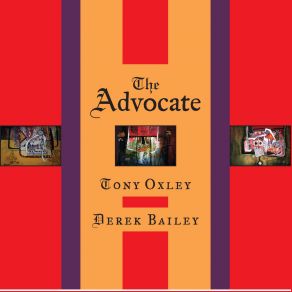The Advocate
Download links and information about The Advocate by Derek Bailey, Tony Oxley. This album was released in 2007 and it belongs to Jazz, Avant Garde Jazz, Avant Garde Metal, Classical genres. It contains 4 tracks with total duration of 40:14 minutes.

|
|
|---|---|
| Artist: | Derek Bailey, Tony Oxley |
| Release date: | 2007 |
| Genre: | Jazz, Avant Garde Jazz, Avant Garde Metal, Classical |
| Tracks: | 4 |
| Duration: | 40:14 |
| Buy it NOW at: | |
| Buy on iTunes $9.99 | |
| Buy on Amazon $12.78 | |
| Buy on iTunes $9.99 | |
Tracks
[Edit]| No. | Title | Length |
|---|---|---|
| 1. | Sheffield Phantoms | 14:00 |
| 2. | Medicine Men | 3:53 |
| 3. | Playroom | 12:27 |
| 4. | The Advocate | 9:54 |
Details
[Edit]The vast majority of The Advocate's tracks were recorded by the late Derek Bailey (guitar) and Tony Oxley (percussion and electronics) in London in 1975. John Zorn's Tzadik label is releasing this collaboration here for the first time. Oxley had recorded his sublime duo project with multi-instrumentalist Alan Davie earlier that year, and Bailey had just issued his London Concert set on Incus. Both men had been part of Barry Guy's London Jazz Composer's Orchestra and had worked together a decade before in the Joseph Holbrooke Trio with Gavin Bryars. There are three improvisations here: two of them, "Sheffield Phantoms" and "Playroom," are longer pieces clocking in at over ten minutes each, while the brief "Medicine Man" is less than three. To be fair, these are of such a piece as collective free improvisation that they were most likely part of a whole, feeling more like one extended work than three individual ones. They involve Bailey meandering around the strings, plucking, scraping, scratching and haltingly slipping around the guitar like an idea regarded as a series of possibilities more than as a single instrument to be forcefully attacked. Oxley uses the entire drum kit, as well as myriad other surfaces, as something with which to explore the essence of percussion's role in separating space more than something to merely "play" rhythmically. The final track is the title piece and was recorded by Oxley at the Barbican as a memorial to Bailey. His use of electronics ad the drum kit are more "rhythmic," but only insofar as they attempt to extend the reach of percussion as an adornment of space and as an extension of time itself. Here, at over nearly six minutes, cymbals are rung and scraped, drums are rolled on and patted, brushed and nearly caressed as Oxley'as electronic blips and samples and glitches underscore, and perhaps point to Bailey's lack of a guitar as a missing element without attempting to make up for that lack. For those who still look to this point in the mid-'70s as a pioneering moment in improvisational music, the document is more than a curiosity piece; it's a piece of found treasure.